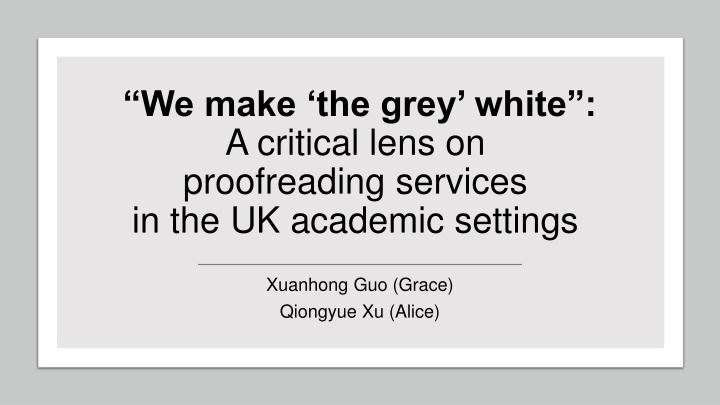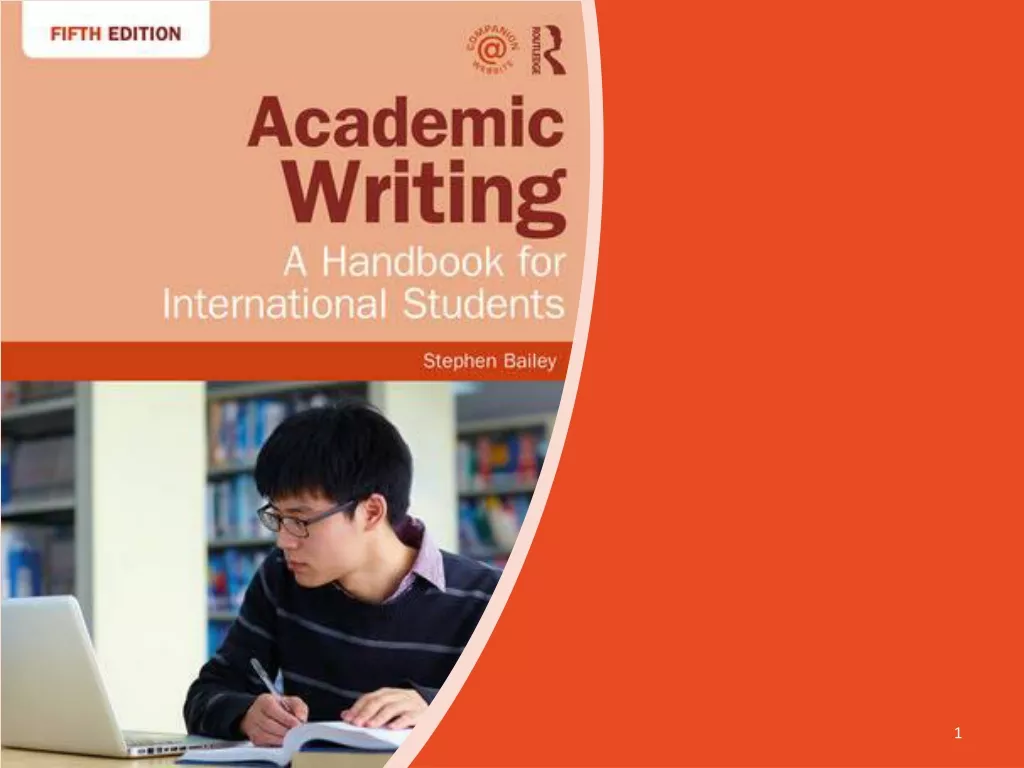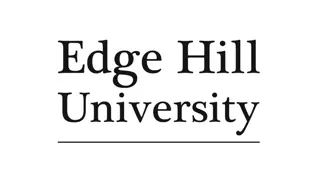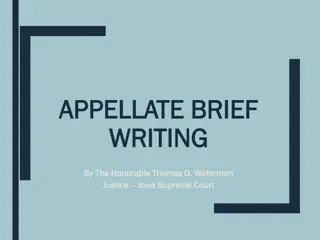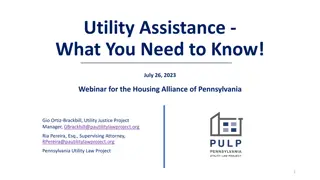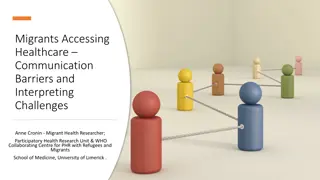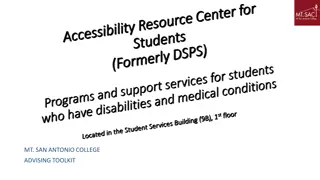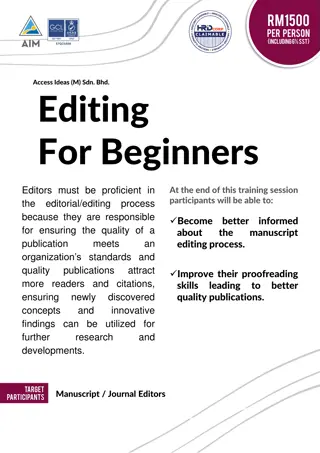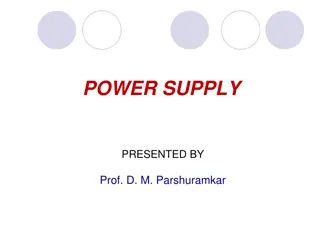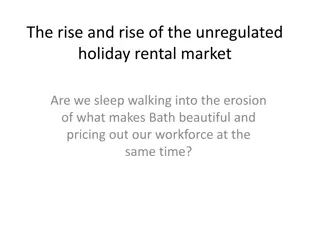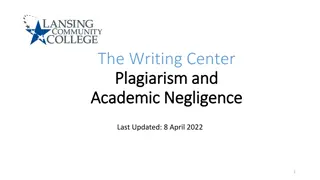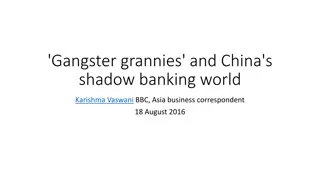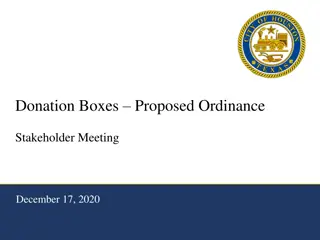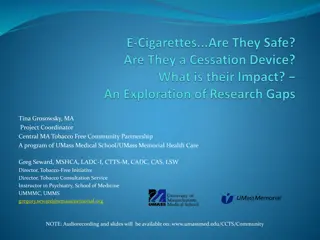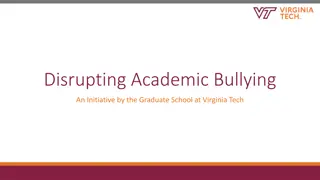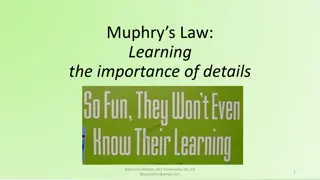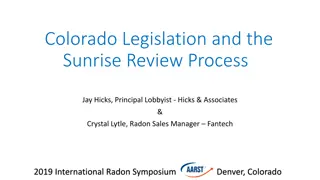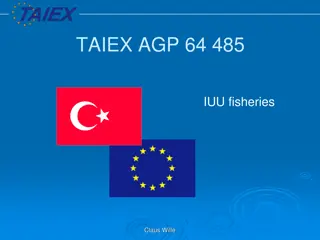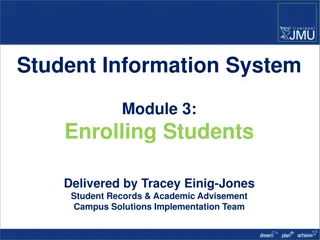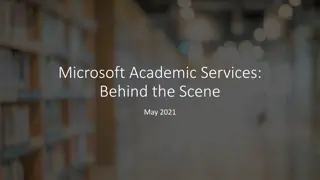Unregulated Proofreading Services in UK Academic Settings
The increasing presence of international students at UK universities necessitates language support, yet the oversight of proofreading services has been lacking. Unregulated interventions by proofreaders raise ethical concerns, impacting student grades. This study explores various perspectives of students, EAP teachers, lecturers, and proofreaders, focusing on Chinese students' unique needs and the dual role of EAP teachers and proofreaders.
Download Presentation

Please find below an Image/Link to download the presentation.
The content on the website is provided AS IS for your information and personal use only. It may not be sold, licensed, or shared on other websites without obtaining consent from the author.If you encounter any issues during the download, it is possible that the publisher has removed the file from their server.
You are allowed to download the files provided on this website for personal or commercial use, subject to the condition that they are used lawfully. All files are the property of their respective owners.
The content on the website is provided AS IS for your information and personal use only. It may not be sold, licensed, or shared on other websites without obtaining consent from the author.
E N D
Presentation Transcript
We make the grey white: A critical lens on proofreading services in the UK academic settings Xuanhong Guo (Grace) Qiongyue Xu (Alice)
Introduction Research background Methodology Findings and discussion Conclusions and pedagogical implications Outline
Introduction: background information The recruitment of more and more international students at UK universities has resulted in an increasing number of students who need various language support. It is still not sure how much help nonnative student writers should be permitted regarding their assessed written assignments (Harwood, Austin & Macaulay, 2009) Students writing skills in the UK academic context are not satisfactory (Newman, 2007) Other areas regarding students academic writing have been explored, while the area of proofreading services for student writing has not been thoroughly investigated (Harwood, Austin & Macaulay, 2012).
Introduction: background information One study focusing on proofreading in student writing reveals that in the UK university context, proofreading has been unregulated. Specifically, anyone could claim themselves as a qualified proofreader no matter whether they have relevant qualifications, experience, knowledge, or training. (Harwood, 2019) For example, Harwood points out that much proofreading is done by institutional outsiders. These outsiders may have little knowledge of university proofreading policies and specifically, the degree to which the institution permits the proofreaders to intervene (Harwood, 2019). He further claims that such variation in proofreaders interventions in student writing raises ethical issues: if proofreaders interventions are at different levels, student writers may receive help to different extent. This could affect their final grades of their assessed assignments (Harwood, 2019).
Research on proofreading services has not gained much attention Previous studies have not involved more than three different aspects Research gaps and the originality of our study Our study involves four different perspectives: students, EAP teachers, lecturers and proofreaders The uniqueness of our student participants: Chinese students as the largest international sub-group which needs further investigation. Within this sub-group, students have different backgrounds regarding EAP learning experience. The dual role of our EAP teacher and proofreader participants
Definition of proofreading Definition of proofreading in student writing: third-party interventions (that entail some level of written alteration) on assessed work in progress (Harwood, Austin & Macaulay, 2012). More traditional, restricted definition of proofreading for publication: a process of identifying typographical, linguistic or positional errors or omissions (Society for Editors and Proofreaders 2005, p. 4). Actually, there are different terms that proofreaders use to introduce their services, such as proofreading , editing and error correction , though proofreading has been the most popular one (Harwood, Austin & Macaulay, 2012).
Review of previous studies Turner & Scott, 2007; Turner & Scott, 2008; Turner, 2010: Ethical issues in proofreading services should be solved by the faculty or the university. The term proofreading is not related to changing content or meaning, but not all proofreaders and students are aware of this restriction. It is challenging for international students to achieve the standards required by lecturers or markers. Some form of collaborative or consultative services or help should be involved. They even suggest that inappropriate interventions may result in students loss of ownership of their own work.
Review of previous studies BALEAP (lively email exchange) (Harwood, Austin & Macaulay, 2010): Reservations about the ethics of proofreading: proofreading serves to mask deficiencies of students at UK universities while these students are required to communicate proficiently in English. Students are responsible for identifying and correcting errors in their writing. The predominance of proofreading services may cultivate a dependency culture . Student writers may seek a false sense of security from these services. Proofreaders may be incompetent or intervene in an ethically inappropriate manner by altering content . Focusing on surface-level problems (grammar and syntax) may give students the impression that these problems are more important than problems at the level of content or argumentation. In favour of proofreaders: It is understandable for international students to seek proofreading services if universities ask for linguistically perfect or error-free texts. Supervisors may offer their help to their students at different levels. When students are struggling with the language, proofreaders are their only choice for help. Universities should help their students solve linguistic problems or challenges because they accepted these students onto their programmes.
Review of previous studies Baty (2006): reports the case of Sean McGeogh, a politics module leader at Coventry, who owns a business aiming to offer one-to-one tuition to students and promises to improve their grades , which has been condemned by university authorities as inappropriate and exploitative . McGeogh points out that his business is a legitimate response to the poor-quality teaching offered by overcrowded and underfunded universities, who leave students to drift unsupported in their rush to recruit ever-larger numbers .
Review of previous studies Buell & Park (2008) (cited in Harwood, Austin & Macaulay, 2012): The proofreading system at the European University Institute in Florence: Aim: the process is formative; students play an active role in reshaping their text Strategies: correction is done by hand, so that students cannot accept changes immediately. Students need to attend a face-to-face tutorial to discuss the tutor s interventions. There are guidelines for this tutorial: (1) clarify any doubts or questions with the correction or problem areas that have emerged in the text; (2) develop strategies for learning from students errors; (3) provide exercises and/or discuss areas for further language revision; (4) assist in setting up a plan for the next phase of the writing process (http:// www.eui.eu/LINGUE/Correction%20Service/Guidelines.shtml).
Review of previous studies McNally & Kooyman (2017): One service provided by Academic Language and Learning (ALL) institutions across Australia is allowing students with low levels of written proficiency to ask for feedback on theirs drafts of assignments prior to submission . The task of the ALL advisor is to suggest how an assignment could be improved, identify common errors, and highlight weaknesses without materially altering the student s work . It is important that proofreading as a type of support is not viewed as heretical, but as a valid pedagogical offering supported by clear institutional agreement on what constitutes acceptable proofreading .
Methodology Semi-structured interview Interview participants: 6 students, 5 lecturers/EAP teachers, 3 proofreaders
Participants Profiles of interviewees Student Postgraduate major Undergraduate background EAP training experience Student 1 TESOL Undergraduate of an ordinary university No Student 2 Gender Undergraduate students of Sino British Joint Universities Yes, in undergraduate Student 3 Literature Undergraduate students of Sino British Joint Universities Yes, in undergraduate Student 4 TESOL Undergraduate of an ordinary university Yes, in pre-sessional course Student 5 Human resources Undergraduate students of Sino British Joint Universities Yes, in undergraduate Student 6 TESOL Undergraduate of an ordinary university No, but worked as an IELTS teacher for six years in Shanghai
Teacher Job Work experience Proofreading experience Teacher 1 Linguistics professor Supervisor for PhD and masters students Has done some for her PhD students Teacher 2 EAP teacher Lead the in-sessional course and one to on consultations; Supervisor for masters students Never, only provide proofreader lists if students ask Teacher 3 Lecturer in MA TESOL Supervisor for masters students Have done proofreading services, not limited in the academy, but also in the area of copy-editing Teacher 4 Lecturer in MA TESOL Leader of pre-sessional course Did it once Teacher 5 Lecturer in MA AL and TESOL worked as an EAP teacher; Supervisor for PhD and masters students Previous work experience Never, but suggested once Proofreader Proofreading experience Qualification Contact method Proofreader 1 5 years Pre-sessional teacher at UK universities; English teacher in different countries; IELTS examiner Master degrees in linguistics- related fields; studied at a PhD level but has not finished it Advertisement at University Proofreader 2 5 years Former university teacher Get a proofreader qualification; run workshops for proofreaders and universities On the proofreader list that Durham University provides Proofreader 3 More than 20 years Freelance lecturer; pre- sessional teacher; MBA programmes manager; Master of Education, PGCE teaching ESL/EFL/Literacy On the proofreader list that Durham University provides
Findings and discussion (1): definition of proofreading Mismatches: Comments on the structure 8 categories of proofreading services (based on Harwood, 2019): 1. Adding words to the writer s text; 2. Removing words; 3. Replacing shorter stretches of the writer s text; 4. Repositioning the writer s words or sentences; 5. Replacing longer parts of the writer s text; 6. Combining of one or more sentences, or division of longer sentences into shorter ones; 7. Changes to punctuation, spelling and formatting; 8. Addressing questions, comments or suggestions to the writer. Matches: Sentence level correction Clarity of writing Advice from the second eye Whether proofreader services should be defined as a service that levels up students writing proficiency
Findings and discussion (1): Grammarly vs Proofreaders Proofreaders: Grammarly with a soul
Findings and discussion (2): The relationship between ethics and proofreading Ethical problems of proofreading services come from rewriting and suggestions related to content. Student participants in our research do not expect proofreaders to comment on their content. Proofreaders respond differently regarding what they do during proofreading: Proofreader 1 said, if he found he is specialised in the subject area of students writing, he would ask whether the student need him to comment on the content. Proofreader 3 said, she would alert students if they fail to address the essay question. It is the proofreader who pushes the limits of proofreading and makes it a grey area and unethical.
Findings and discussion (2): The relationship between ethics and proofreading: Different opinions on the academic integrity in the improvement of students language after using profreading services: Students: texts should be understood well by markers. However, most student participants do not realise the relationship between ethics and proofreading services if their language is levelled up by proofreaders. Two students: Academic integrity depends on the creativity of the content Proofreaders: opposite opinions on whether proofreaders should level up students writing. Proofreader 3: it is proofreaders job Proofreader 2: proofreaders should not proofread work written by students with low written proficiency Lecturers: tolerance of students language regarding marking criteria: The language should not impede the understanding of the message Ethical issues: Assignments which have been proofread do not reveal students language ability Fairness: it is unfair for students who do not ask for proofreading services
The reasons why proofreading emerge and become prominent 1. Mark or grade pursuit: mismatch between students and lecturers -> lecturers: students want higher marks vs students: do not lose marks 2. Pressure: from parents or society 3. Competition: among peers who seek proofreading services Findings and discussion (2)
Deeper reasons: Students who got IELTS 6 or 7 are not competent in the areas of English, academic writing and academics Findings and discussion (2) 1. University entry requirements ? IELTS 6 or 7 cannot ensure students to be competent on their programmes 2. University English language support? One-to-one consultation appointments are not sufficient. Universities should take more responsibilities
EAP teachers/one-to-one consultants vs proofreaders: 1. Students expect to learn from EAP teachers /one-to- one consultants feedback; students do not trust proofreaders. 2. Communication between students and EAP teachers/one-to-one consultants is a dialogue; feedback from proofreading is always a monologue 3. Proofreading works on the writing, which is the product, while English language support works on the writer, which is the person, the student. 4. Proofreaders as helpers and some students think they can learn from proofreaders Findings and discussion (3)
Our current study has conducted interviews to attempt to define proofreading; Investigate the reasons that cause the emergence and features of proofreading services; Explore the relationship between proofreading and ethics in academic writing; Hoping to build foundations for providing some possible solutions in terms of proofreading services. Conclusion
Specific solutions Three aspects: School, proofreaders and students School: policy about the permission of proofreading A union of proofreading services; Involve four parties proofreaders, students, supervisors and regulators; Proofreading services as a separate department at universities and recruit qualified proofreaders; Proofreaders and one-to-one consultants can work together to develop students' ability in academic writing Pre-sessional courses should be open to all candidates as no one is a native of academic writing One-to-one consultations should have more appointments and more consultants. EAP teachers should not only teach students norms of academic writing, but also focus on basic English language teaching or specific academic literacy if the students need.
Specific solutions Proofreaders: Get proofreading qualifications or join a professional body EAP teachers can be trained to be proofreaders Students: have a clear understanding of proofreading service; Should be aware of relevant university policies
References Baty, P. (2006). Lecturer admits role in tutor firm. Times Higher Education(20 October), < https://www.timeshighereducation.com/cn/news/lecturer-admits-role-in-tutor-firm/206120.article > Accessed 18.11.21 Buell, M.Z., and S.J. Park. 2008. Positioning expertise: The shared journey of a South Korean and a North American doctoral student. In Learning the literacy practices of graduate school: Insiders reflections on academic enculturation, ed. C.P. Casanave and X. Li. Ann Arbor, MI: University of Michigan Press. Harwood, N., Austin, L., & Macaulay, R. (2009). Proofreading in a UK university: Proofreaders beliefs, practices, and experiences. Journal of Second Language Writing, 18(3), 166-190. Harwood, N., Austin, L., & Macaulay, R. (2010). Ethics and integrity in proofreading: Findings from an interview-based study. English for Specific Purposes, 29(1), 54-67. Harwood, N., Austin, L., & Macaulay, R. (2012). Cleaner, helper, teacher? The role of proofreaders of student writing. Studies in higher education, 37(5), 569-584. Harwood, N. (2019). I Have to Hold Myself Back from Getting into All That : Investigating Ethical Issues Associated with the Proofreading of Student Writing. Journal of Academic Ethics, 17(1), 17-49. McNally, D., & Kooyman, B. (2017). Drawing the line: views from academic staff and skills advisors on acceptable proofreading with low proficiency writers. Journal of Academic Language & Learning, 11, A-145 A-158. Newman, M. (2007). Appalling writing skills drive tutors to seek help. Times Higher Education(16 March), <http://www.timeshigher- education.co.uk/story.asp?sectioncode=26&storycode=208242> Accessed 18.11.21. Society for Editors and Proofreaders. 2005. Code of practice. http://www.sfep.org.uk/pdocs/ sfepcop.pdf (accessed 18.11.21). Scott, M., & Turner, J. (2008). Proofreading: The contemporary backdrop. Paper presented at the 3rd International Santa Barbara Conference on Writing Research, Santa Barbara, CA. Turner, J., & Scott, M. (2007). English as a lingua franca and the rise of proofreading in the academy. Paper presented at the BALEAP Conference, Durham, UK. Turner, J. 2010. Supporting Academic Literacy: Issues of Proofreading and Language Proficiency. In: George Blue, ed. Developing Academic Literacy. Bern: Peter Lang, pp. 39-51.
